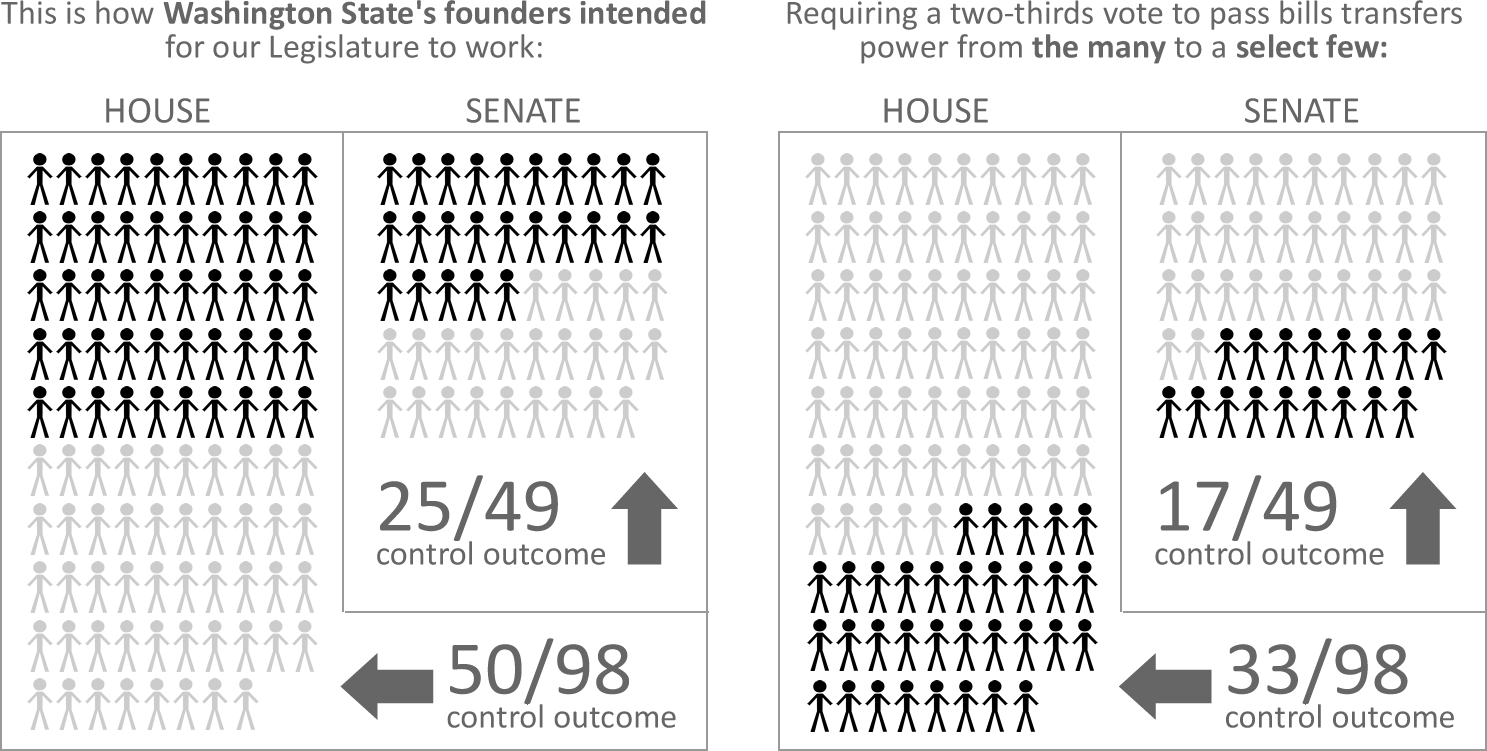Anyone who has spent time attempting to understand the politics of the Washington State Republican Party knows that Republicans spend an awful lot of time listening to (and taking their cues from) militant, right wing initiative profiteer Tim Eyman, who has become obsessed lately with gutting Washington’s cherished tradition of majority rule and replacing it with rule by the few.
Eyman is demanding that legislators vote to change the Constitution to require that any bill that raises or even recovers revenue for the state treasury receive a two-thirds vote on the floor of each house of the Legislature — otherwise, it would die. Such a change to our plan of government would permanently transfer power from the many to a few, as this pictogram illustrates:

House and Senate Republicans have taken up Eyman’s cause and are beating the drum for an amendment, along with Eyman’s friend Jason Mercier, who works for John Carlson’s Washington Policy Center. Eyman and Republicans insist that altering the Constitution to sabotage Article II, Section 22 would be a good thing.
If supermajority requirements are so wonderful and lead to bipartisan compromise, why not require supermajority votes for everything? (And, for that matter, why stop at two-thirds? What about three-fourths… or nine-tenths?)
Republicans don’t seem to have answers to these questions.
Last autumn, I urged Carlson and other backers of I‑1366 to imagine the shoe being on the other foot. What if it were progressives who were proposing requiring supermajority votes for certain actions? Would Republicans be on board with that? (We can’t imagine that they would be.)
Republicans have made it clear over the last few days that they have an extreme, aggressive agenda for Washington State. Jamal Raad, the Washington State Democratic Party’s Communications Director, has been keeping an eye on the bills that Republican legislators have been filing for this year’s short session. This morning, he sent out a compilation of some of them to the press:
HB 2291 — Rolling Back The Minimum Wage. Republicans want to account for health benefits when calculating the minimum wage rate and provide a “youth wage” which would cut the minimum wage for thousands of workers.
HB 2294 - Defunding Planned Parenthood. Republicans in Washington State are joining the national Republican mania of defunding Planned Parenthood.
HB 2325 — Math, Science and…Guns? Republicans want to bring the NRA into our high schools at taxpayer expense to teach our students about their far-right interpretation of the 2nd Amendment.
SB 6158 — Raffling Off Guns Without Background Checks. This bill would allow conservative and Republican political groups to give out guns to their members at fundraisers without voter-approved universal background checks.
SB 6173 — Banning Policies To Limit Greenhouse Gas Emissions. One of the State Senate’s lead recipients of campaign cash from the fossil fuel industry, Doug Ericksen, a Donald Trump supporter, is sponsoring legislation that would block action to protect Washingtonians from climate change.
HB 2293 — Awarding Electoral Votes To Republicans. Knowing they are most likely nominating a radical conservative like Donald Trump for President who has no shot at winning here in Washington state, Republicans are trying to sneak a way to award electoral votes to the GOP nominee for president even when they eventually lose.
None of these bills stand a chance of becoming law or even passing the Legislature, because Democrats currently control the governor’s mansion and the House. However, the Democratic House majority has been whittled down to a margin of just one vote, and Republicans are making a play for the House in 2016. They’re also looking to maintain their hold on the Senate.
If they’re successful, at this time next year, they’ll control both houses of the Legislature for the first time in decades — and they’d be able to pass all of the above bills with all or nearly all of their members marching in lockstep.
(Article II, Section 22 of Washington’s Constitution says bills pass by majority vote, and if you can count to fifty in the House and twenty-five in the Senate, then you can get a bill sent to the governor’s desk. It’s been this way since statehood.)
But what if Tim Eyman’s rules were in effect for the aforementioned bills? What if a two-thirds vote were the standard for passage? Why, in that case, Democrats could block them… all of them, even if they only had a submajority of each house of the Legislature (and not a majority). It wouldn’t matter how successful Republicans were at winning in swing districts in 2016. They wouldn’t be able to implement their agenda on their own, because Democrats would have a legislative veto over them.
Majority rule is good for everyone — Democrats and Republicans alike — but unfortunately, this seems to be lost on the Republicans currently serving in the Legislature. We wonder: How would Republicans like Bruce Dammeier and Drew MacEwen feel about a constitutional amendment requiring a two-thirds vote for bills to roll back the minimum wage, override executive orders by the governor, or allow guns to be purchased with no questions asked? Do Republicans still think supermajorities are a good idea in those cases? And if not — why not?

